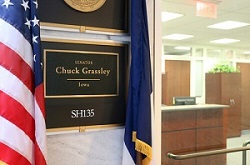Senator Grassley Leads Bi-Partisan Pro-Whistleblower Push to Amend False Claims Act

Perennial whistleblower-champion Senator Chuck Grassley (R-Iowa) is at it again. This time with the bi-partisan legislation he just introduced to further expand the reach of the False Claims Act, the government’s key fraud enforcement tool. The statute was enacted in 1863 to fight widespread fraud by companies selling rotten food, sickly mules, and defective weapons to the Union Army during the Civil War.
But for more than a century the law was largely ignored until Senator Grassley introduced a series of amendments, starting in 1986, that gave the Act more teeth. Most importantly, the changes increased the protections and incentives for whistleblowers (called Relators) to file suit under the statute. The biggest one being the whistleblower’s right to recover a reward of up to 30% of any government recovery.
Ever since, whistleblowers have been responsible for the lion’s share of cases brought under the statute and the billions of dollars the government has recovered each year. This past year alone, DOJ reported recovering roughly $2.2 billion, with three-quarters of that amount coming from cases originated by whistleblowers. Since 1986, DOJ has recovered roughly $64.5 billion under the statute, with more than 70% of that amount (almost $50 billion) stemming from whistleblower actions.
With the False Claims Amendments Act of 2021, Senator Grassley — with his bi-partisan crew of Senators Patrick Leahy (D-VT), Dick Durbin (D-IL), John Kennedy (R-LA), and Roger Wicker (R-MS) — hopes to strengthen this trend of powerful fraud enforcement. There are 4 key provisions:
- Burden Shifting for Proving Materiality. Once the government or Relator establishes materiality (e., showing the underlying fraud was relevant to the government’s payment decision) by a preponderance of the evidence, the burden would shift to the defendant to rebut materiality by clear and convincing evidence.
- Paying Government Discovery Costs. In non-intervened cases (e., when the government does not join in the Relator’s action), a party requesting discovery from the government would potentially be required to pay the government’s costs and attorneys’ fees.
- Government Dismissal. If the government moves to dismiss a non-intervened case, it would have the burden of demonstrating the reasons for the requested dismissal, and the Relator would have the opportunity to show the proffered reasons are fraudulent, arbitrary and capricious, or contrary to law.
- Post-Employment Retaliation. The provisions precluding retaliating against whistleblowers would be expanded to cover both current and former employers.
If passed, these changes would apply to all future and pending False Claims Act cases.
In a summary of the proposed legislation, Senator Grassley and his colleagues make clear their purpose in sponsoring the legislation is to further support whistleblowers in their pursuit of False Claims Act cases, especially when the Government does not formally join them in their quest. With shifting the ultimate burden on materiality, for example, the senators hope to “reduce instances in which fraudsters can successfully argue that the government’s continued conduct made what would otherwise be a serious violation void.”
Likewise, the Government discovery cost-shifting provisions are aimed at discouraging defendants from going on expensive “fishing expeditions to see if someone, somewhere, in the government was aware of the fraud” so they can then try to argue “the fraud was not material because no government action was taken.” The sponsoring senators pointed to the futility of this kind of exercise as it ignores “that government bureaucrats are highly segmented and often unable to make key decisions for their monolithic organizations. Nor are they highly motivated to stop fraud.”
The proposed strictures on the Government’s right to dismiss a non-intervened action along with the expanded anti-retaliation protections are also designed to serve a decidedly pro-whistleblower purpose. That is why several of the leading whistleblower advocacy groups have come out in strong support of the legislation. In a joint statement they wrote to Senators Grassley and Durbin, Taxpayers Against Fraud, Project on Government Oversight, Government Accountability Project, and National Whistleblower Center applauded the proposed legislation as “critical to the continued success of False Claims Act enforcement and the public-private partnership.”
However, not everyone is so sanguine about the amendments. As Law360 reports, some whistleblower supporters believe the proposed changes on proving materiality only further confuse the standard that has to be met. And others are concerned the retroactivity provision applying the amendments to pending actions runs the risk of violating the ex post facto clause of the Constitution, giving defendants a potential cause to appeal a losing jury verdict.
Where this legislation goes from here remains to be seen. With its strong bi-partisan support, so rare these days, it is sure to gain traction as it moves through Congress. Hopefully as it does, any remaining kinks in the language or design will be ironed out so the ultimate purpose of the amendments are fully realized. That purpose being no better stated than by the sponsoring senators themselves: “protecting taxpayers and whistleblowers who shine a light on fraud, waste and abuse” (Grassley); ensuring that those who defraud the federal government are held accountable” (Leahy); and ultimately, “ensuring the False Claims Act remains the most effective tool for combatting fraud and rewarding those who expose it” (Wicker).
Read More:
- False Claims Act
- Whistleblower Champion Chuck Grassley Pushes for Further Strengthening of False Claims Act (Again)
- Whistleblower Reward Laws
- Whistleblower Protection Laws
- Whistleblower FAQs
- Contact Us for a Confidential Consultation
Tagged in: FCA Federal, FCA Materiality, Importance of Whistleblowers, Retaliation, Whistleblower Rewards,